 Society
Society

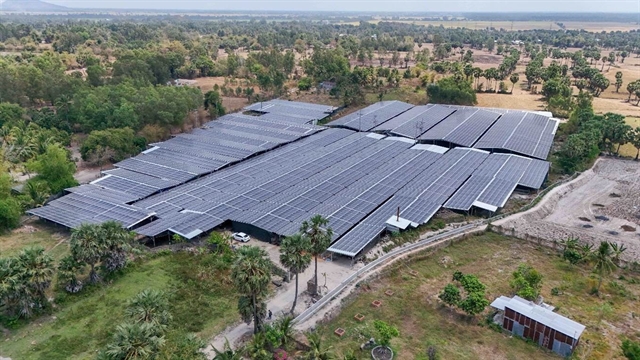 |
| The 3ha Nương Farm in An Giang Province’s Tịnh Biên Town, which grows various types of mushrooms, has installed a solar power system. — VNA/VNS Photo |
AN GIANG — Nương Farm in An Giang Province uses solar energy to cultivate mushrooms using a circular agricultural model, practices that promote sustainable and efficient farming.
Established in 2020 by Châu Thị Nương, director of the Tà Đảnh Agricultural Co-operative, the three-hectare farm in Tịnh Biên Town grows various types of mushrooms like oyster, straw, black termite, lingzhi, and cordyceps.
The ethnic Khmer woman conceived the idea during the COVID-19 pandemic as demand for clean foods and medicinal products increased.
The farm utilises agricultural by-products such as straw, corn bran and rice bran as a substrate for mushroom cultivation.
After harvesting, the leftover substrate is used to raise earthworms, which in turn produce organic fertiliser for rice and vegetable fields.
This circular model has reduced production costs by 30 per cent and increased mushroom yields by 40 per cent.
Solar panels installed above the mushroom beds help maintain ideal growing conditions by regulating temperatures even when temperatures reach 35 degrees Celsius.
The farm now harvests up to three tonnes of black termite mushrooms from 1,000 spawn bags as against the usual 1.5–2 tonnes.
It uses solar energy during the day and switches to mains power at night, halving electricity costs. The surplus electricity is sold back to the An Giang Power Company for additional income.
Nương is among many women in the Cửu Long (Mekong) Delta who are applying a solar-powered production model to reduce costs and protect the environment.
The model supports sustainable farming and ensures stable power supply, allowing surplus electricity to be sold back to the national grid.
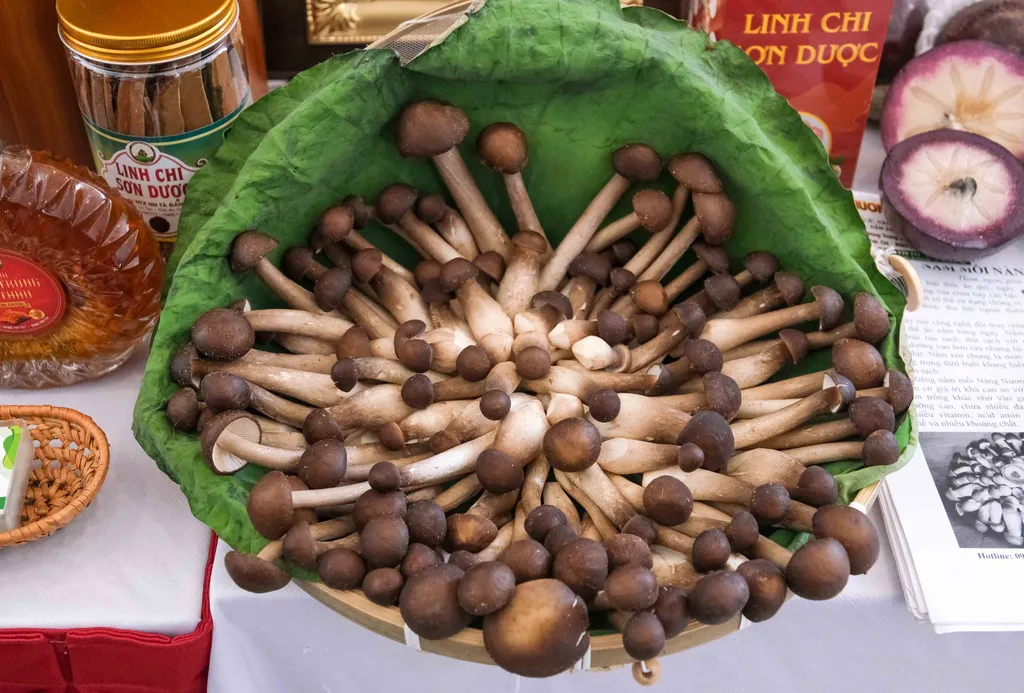 |
| Black termite mushrooms grown on Nương Farm in An Giang Province’s Tịnh Biên Town currently sell for around VNĐ240,000 (US$9.3) per kilogramme. — VNA/VNS Photo. |
In Bạc Liêu Province’s Đông Hải District, Võ Thị Hồng Thoại has adopted solar energy for her traditional anchovy fish sauce production.
After working for nearly four decades in the public sector, Thoại retired in 2017.
Two years later, she invested VNĐ7 billion (US$270,000) to establish the Vũ Võ Bạc Liêu Joint Stock Company, which now operates a fish sauce production facility with 48 fermentation tanks, each holding 50 tonnes of anchovies.
One initial challenge was the production facility’s reliance on the national power grid as fish sauce production requires continuous aeration and mixing, and any power outage disrupts the entire process.
Thoại says: “There were times [during outages] we needed up to 30 workers instead of the usual 10. Labour costs spiked while productivity fell.”
To address this, she installed a 7MW rooftop solar system in 2020. The results have been excellent, with electricity costs halving from VNĐ18 million ($700) per month and production becoming stable.
She says: “I saw huge potential in solar energy. It saves costs and ensures a steady power supply – ideal for our non-stop production.”
The solar energy system not only powers the facility but also generates a surplus that is sold to the grid.
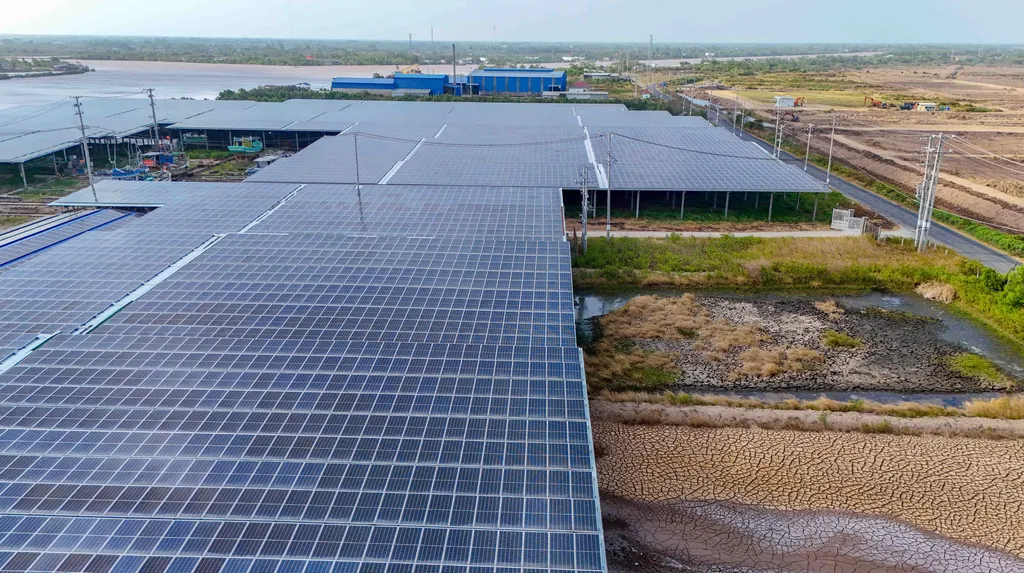 |
| Solar panels installed at Võ Thị Hồng Thoại's Vũ Võ Bạc Liêu Joint Stock Company, which has a fish sauce production facility in Bạc Liêu Province’s Đông Hải District. — VNA/VNS Photo |
Contributions
Female entrepreneurs in the Mekong Delta such as Thoại and Nương have been recognised for their contributions to production initiatives, producing high-quality products and creating jobs.
Thoại’s company produces high-quality fish sauces that are sold nationwide.
Its Thiên Phú anchovy fish sauce 32N has been recognised as a three-star product under the country’s “One Commune – One Product” programme.
Thoại’s company, which also has HACCP and ISO certification for product quality, earned revenues of more than VNĐ1 billion ($39,000) last year.
Nương Farm supplies two to three tonnes of mushrooms a month to supermarkets in An Giang and HCM City.
Its chemical-free lingzhi mushrooms have also been exported to Japan.
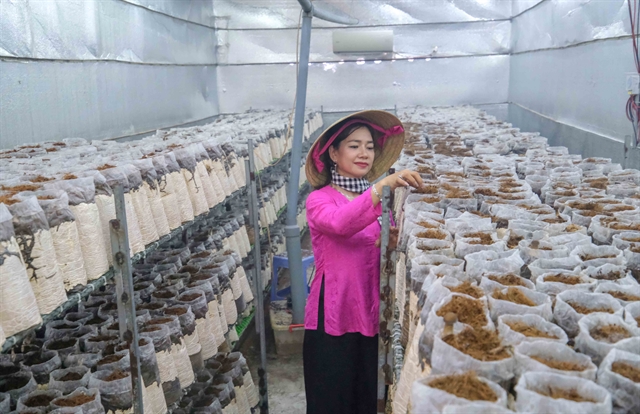 |
| Châu Thị Nương checks mushroom grown at her Nương Farm in An Giang Province’s Tịnh Biên Town. — VNA/VNS Photo |
The farm provides steady employment for dozens of Khmer women, many aged over 50, and they earn VNĐ250,000-300,000 ($10-12) per day.
One of them is 64-year-old Quách Thị Hồng Liên, who works alongside her husband and daughter.
“My husband and I are old and have chronic health issues, and so we can no longer do heavy labour,” she says.
“The work here is light and the income helps us cover daily expenses. It is a dream job for elderly people like us.”
Nương Farm’s “Using rice straw to cultivate black termite mushroom embryos” initiative won a first prize at the 2022 agricultural livelihood innovation contest held by the Centre for Research on Resource and Rural Development.
The farm was also named among the Top 10 Outstanding Businesses at the 2023 Việt Nam ESG (Environmental, Social and Governance) Innovation Awards.
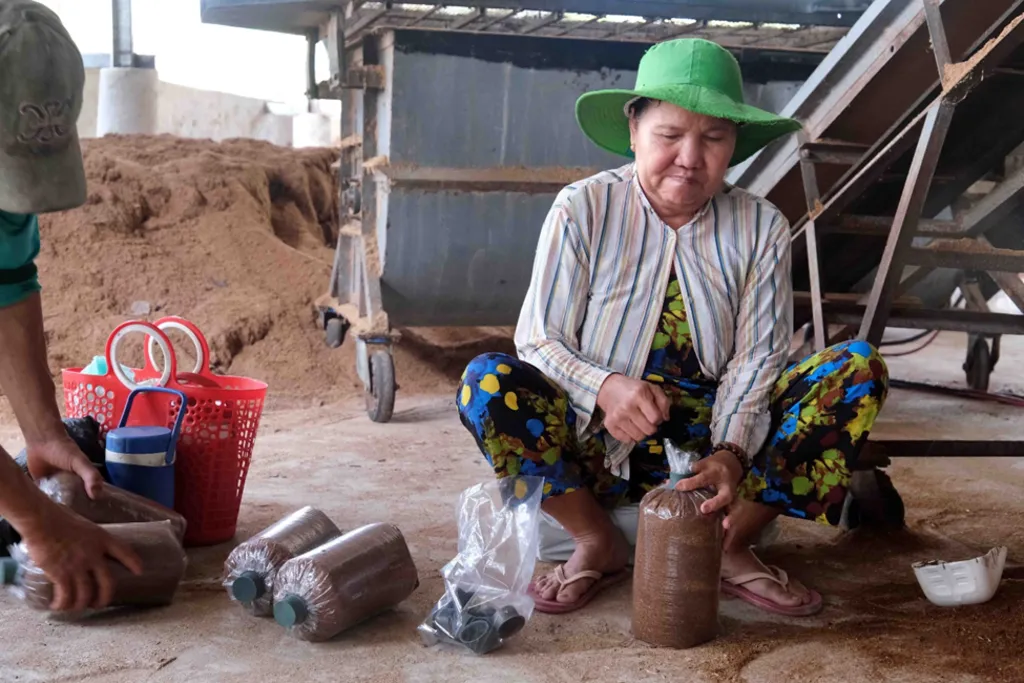 |
| Quách Thị Hồng Liên, 64, works at Nương Farm in An Giang Province’s Tịnh Biên Town packing mushroom spawn bags and earning VNĐ20,000-30,000 (77 US cents – S$1.2) per hour. — VNA/VNS Photo |
Women lead green transition
In the Mekong Delta, where climate change is intensifying, women are playing a key role in building sustainable solutions, according to experts.
Nguyễn Thị Thương Linh, deputy director of the Việt Nam Chamber of Commerce and Industry’s Mekong Delta chapter, cited a 2022 UN Women report showing that women account for 70 per cent of those affected by climate change.
But these vulnerable groups often emerge as drivers of change, she pointed out.
“Women and children are 14 times more likely than men to be impacted by natural disasters.
“But in the face of adversity, their potential becomes clear.”
Lý Quốc Đẳng of the faculty of social sciences and humanities at Cần Thơ University said his 2024 study on urban flooding in Cần Thơ City found that women tend to suffer more than men due to their roles in families and communities. During floods, for example, women often face greater water shortages because their daily needs are higher.
“Because of this difference, women-led businesses are more likely to invest in environmentally friendly solutions than those led by men.”
Đẳng, founder of Y-Farm Mekong, a youth-led network promoting ecological farming, said women outnumber men in the network and show more interest in sustainable farming practices.
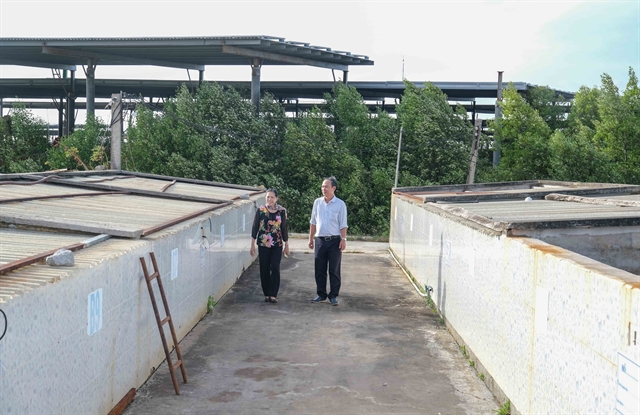 |
| Võ Thị Hồng Thoại (left) at her anchovy fish sauce production facility in Bạc Liêu Province’s Đông Hải District. — VNA/VNS Photo |
Associate Professor Lê Anh Tuấn, advisor to the Research Institute for Climate Change at Cần Thơ University, said the delta is not only Việt Nam’s agricultural hub but also has great potential for renewable energy, especially solar and wind.
In recent years, more and more farmers have been installing solar systems to power irrigation, aquaculture, vegetable cultivation, and post-harvest processing, he said.
He said solar energy helps reduce costs, lower carbon emissions, improve soil health, increase productivity, improve efficiency, and achieve sustainability.
To promote rooftop solar systems for self-use, the Government issued Decree No. 135 on October 22, 2024, allowing solar power producers to sell surplus electricity – of up to 20 per cent of installed capacity – to the power grid.
In the Mekong Delta, authorities are helping women adopt solar energy for agriculture and providing them with training in green technology and financial assistance to install solar systems.
In 2021, the An Giang Province Women's Union launched a financing programme to help women adopt solar energy in agriculture and business.
In its first phase, Nguyễn Thị Kim Loan in Chợ Mới District and Trần Kim Hồng in Tri Tôn District each received a VNĐ150 million ($5,800) loan from the “Women’s Empowerment for a Climate-Resilient Society” project supported by the United Nations Environment Programme to install rooftop solar systems.
Nguyễn Thị Quyến, deputy chairwoman of the An Giang Women’s Union, said the programme helped women access renewable energy financing and adopt clean production models.
“With preferential loans for rooftop solar systems, we aim to raise awareness among female business owners about environmental protection and promote efficient resource and energy use.
“This contributes to improving environmental quality, protecting public health, cutting production costs, increasing profits, and raising household incomes.” — VNS




